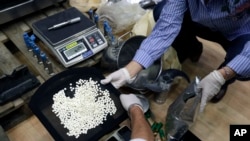A synthetic psychoactive drug linked to substance abuse in the Middle East and said to be a fund-raising tool and stimulant for Islamist militants is more dangerous than previously thought, scientists said on Wednesday.
The stimulant, called fenethylline and by its trade name Captagon, is a super-boosted amphetamine, they said, and has unique chemical complexities allowing it to induce potent psychoactive effects far more rapidly than amphetamines alone.
Developing a vaccine to mitigate its effects in people is possible, the researchers said, after their laboratory work in mice showed promise.
Publishing their findings in the journal Nature, the scientists, from the Scripps Research Institute in the United States, said Captagon's unique structure and mode of action may explain why it has become so widely abused.
They warned its popularity among drug users could spread from the Middle East across the world.
Experts estimate that in Saudi Arabia, some 40 percent of drug users between the age of 12 and 22 are addicted to fenethylline.
Production and trafficking of the drug -- which the Scripps team said is "very easy to make" -- and of counterfeits of it, are reported to be a source of revenue for militant groups in Syria and Iraq.
Kim Janda, who co-led the Scripps research team, told reporters in a telephone briefing he first became interested in Captagon because it was being cited "as a possible performance-enhancing stimulant for (Islamic State) fighters and as a source of pharmacological morale building."
That's when people get high to increase their focus on a particular task and to reduce anxiety.
"It wasn't really clear to me why this drug was being used.
It's rewarding effects basically didn't make sense," he said, adding that as a relatively new and obscure drug, little had been known about Captagon's chemical structure.
In an effort to find out more, Janda's team used what they describe as a "dissection through vaccination" scientific technique which allowed them to parse out various components of the drug and test each one for its effects on the brain.
Using mice and their own manufactured Captagon in a lab, the team discovered that the drug produces its distinctive effects from a functional synergy between theophylline, a drug traditionally used to treat respiratory diseases, and amphetamine, a stimulant.
"This combination greatly enhances the amphetamine's psychoactive properties," Janda said. "So now it now makes sense why it's being so heavily abused."
The Scripps results mean the team has developed a potentially effective vaccine that can mitigate the effects Captagon in mice -- a product that could be developed further for use in people, Janda said.
"Our initial intent was not to develop a vaccine," but to use a vaccine-approach to identify the chemical underpinnings of Captagon, he explained. "But if there was an interest in developing it as vaccine for humans, we could do that."





